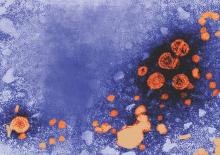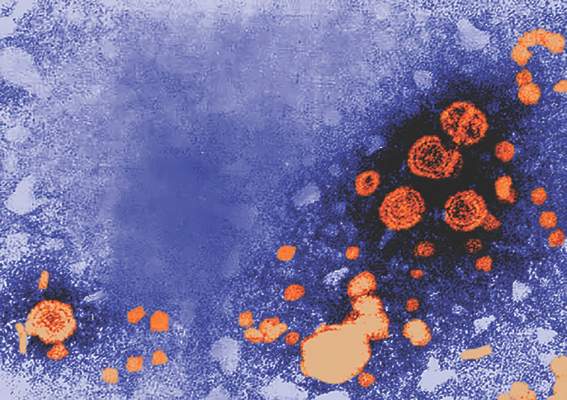User login
SAN FRANCISCO – NVR 3-778, an experimental hepatitis B virus (HBV) core inhibitor, showed substantial activity and was well tolerated in an initial phase Ib study presented as a late-breaker at the annual meeting of the American Association for the Study of Liver Diseases.
Through its core-related mechanisms, which may prevent viral assembly and replication, NVR 3-778, particularly when used in combination with other antivirals, may represent a step “toward a goal of increased durable response rates in HBV patients,” reported Dr. Man-Fung Yuen of Queen Mary Hospital, University of Hong Kong.
In this phase Ib study, safety and efficacy of NVR 3-778 were evaluated in 36 HBV-infected patients who were randomized to one of four dosing cohorts. An additional eight patients received a matching placebo. Enrollment requirements included serum HBV DNA greater than 20,000 IU/mL and age between 19 and 65 years. ALT levels could be normal or less than seven times the upper limit of normal. The majority of subjects were male.
The four doses of NVR 3-778 evaluated were 100 mg once daily (10 patients), 200 mg once daily (10 patients), 400 mg once daily (8 patients), and 600 mg twice daily (8 patients). Viral load reductions and safety were monitored.
All doses were well tolerated with no treatment-related discontinuations or serious adverse events observed. A single patient, who was on the lowest dose, developed a serious rash. No other patients developed significant rashes.
There appeared to be a dose response with no significant reductions in HBV DNA observed on the lowest dose and modest reductions with the 200-mg and 400-mg once-daily doses. On the 600-mg twice-daily dose, HBV DNA levels fell 1.72 log10 IU mL (range, 1.06-3.71 log10 IU/mL) from baseline.
Based on the dose response and the tolerability of the 600-mg twice-daily dose, studies are now planned to evaluate higher doses. Greater viral control may also be achieved if this agent is combined with other agents, such as peg-interferon or a nucleoside. According to Dr. Yuen, there are already plans to evaluate both types of combinations.
As a core inhibitor, NVR 3-778 “can potentially inhibit viral assembly, HBV genome replication, covalently closed circular DNA [the permanent viral DNA structure in the nuclei of infected cells], and hepatic reinfection cycles,” Dr. Yuen said. This is not achieved routinely with current therapies, which Dr. Yuen said can suppress HBV replication but must be maintained to sustain control.
The further development of NVR 3-778 and other core inhibitors is being directed “toward a goal of increased durable response rates in HBV patients,” Dr. Yuen reported.
SAN FRANCISCO – NVR 3-778, an experimental hepatitis B virus (HBV) core inhibitor, showed substantial activity and was well tolerated in an initial phase Ib study presented as a late-breaker at the annual meeting of the American Association for the Study of Liver Diseases.
Through its core-related mechanisms, which may prevent viral assembly and replication, NVR 3-778, particularly when used in combination with other antivirals, may represent a step “toward a goal of increased durable response rates in HBV patients,” reported Dr. Man-Fung Yuen of Queen Mary Hospital, University of Hong Kong.
In this phase Ib study, safety and efficacy of NVR 3-778 were evaluated in 36 HBV-infected patients who were randomized to one of four dosing cohorts. An additional eight patients received a matching placebo. Enrollment requirements included serum HBV DNA greater than 20,000 IU/mL and age between 19 and 65 years. ALT levels could be normal or less than seven times the upper limit of normal. The majority of subjects were male.
The four doses of NVR 3-778 evaluated were 100 mg once daily (10 patients), 200 mg once daily (10 patients), 400 mg once daily (8 patients), and 600 mg twice daily (8 patients). Viral load reductions and safety were monitored.
All doses were well tolerated with no treatment-related discontinuations or serious adverse events observed. A single patient, who was on the lowest dose, developed a serious rash. No other patients developed significant rashes.
There appeared to be a dose response with no significant reductions in HBV DNA observed on the lowest dose and modest reductions with the 200-mg and 400-mg once-daily doses. On the 600-mg twice-daily dose, HBV DNA levels fell 1.72 log10 IU mL (range, 1.06-3.71 log10 IU/mL) from baseline.
Based on the dose response and the tolerability of the 600-mg twice-daily dose, studies are now planned to evaluate higher doses. Greater viral control may also be achieved if this agent is combined with other agents, such as peg-interferon or a nucleoside. According to Dr. Yuen, there are already plans to evaluate both types of combinations.
As a core inhibitor, NVR 3-778 “can potentially inhibit viral assembly, HBV genome replication, covalently closed circular DNA [the permanent viral DNA structure in the nuclei of infected cells], and hepatic reinfection cycles,” Dr. Yuen said. This is not achieved routinely with current therapies, which Dr. Yuen said can suppress HBV replication but must be maintained to sustain control.
The further development of NVR 3-778 and other core inhibitors is being directed “toward a goal of increased durable response rates in HBV patients,” Dr. Yuen reported.
SAN FRANCISCO – NVR 3-778, an experimental hepatitis B virus (HBV) core inhibitor, showed substantial activity and was well tolerated in an initial phase Ib study presented as a late-breaker at the annual meeting of the American Association for the Study of Liver Diseases.
Through its core-related mechanisms, which may prevent viral assembly and replication, NVR 3-778, particularly when used in combination with other antivirals, may represent a step “toward a goal of increased durable response rates in HBV patients,” reported Dr. Man-Fung Yuen of Queen Mary Hospital, University of Hong Kong.
In this phase Ib study, safety and efficacy of NVR 3-778 were evaluated in 36 HBV-infected patients who were randomized to one of four dosing cohorts. An additional eight patients received a matching placebo. Enrollment requirements included serum HBV DNA greater than 20,000 IU/mL and age between 19 and 65 years. ALT levels could be normal or less than seven times the upper limit of normal. The majority of subjects were male.
The four doses of NVR 3-778 evaluated were 100 mg once daily (10 patients), 200 mg once daily (10 patients), 400 mg once daily (8 patients), and 600 mg twice daily (8 patients). Viral load reductions and safety were monitored.
All doses were well tolerated with no treatment-related discontinuations or serious adverse events observed. A single patient, who was on the lowest dose, developed a serious rash. No other patients developed significant rashes.
There appeared to be a dose response with no significant reductions in HBV DNA observed on the lowest dose and modest reductions with the 200-mg and 400-mg once-daily doses. On the 600-mg twice-daily dose, HBV DNA levels fell 1.72 log10 IU mL (range, 1.06-3.71 log10 IU/mL) from baseline.
Based on the dose response and the tolerability of the 600-mg twice-daily dose, studies are now planned to evaluate higher doses. Greater viral control may also be achieved if this agent is combined with other agents, such as peg-interferon or a nucleoside. According to Dr. Yuen, there are already plans to evaluate both types of combinations.
As a core inhibitor, NVR 3-778 “can potentially inhibit viral assembly, HBV genome replication, covalently closed circular DNA [the permanent viral DNA structure in the nuclei of infected cells], and hepatic reinfection cycles,” Dr. Yuen said. This is not achieved routinely with current therapies, which Dr. Yuen said can suppress HBV replication but must be maintained to sustain control.
The further development of NVR 3-778 and other core inhibitors is being directed “toward a goal of increased durable response rates in HBV patients,” Dr. Yuen reported.
AT THE LIVER MEETING 2015
Key clinical point:The experimental agent NVR 3-778 produced significant reductions in hepatitis B viral load in an initial dose-ranging study.
Major finding: At the highest tested dose (600 mg twice daily), the mean 28-day reduction in hepatitis B virus DNA levels reached 1.72 log10 IU/mL (range, 1.06-3.71 log10 IU/mL).
Data source: Multicenter open-label phase Ib study.
Disclosures: Dr. Chan reported financial relationships with Abbvie, Bristol-Myers Squibb, Echosens, Gilead, Novartis, and Roche

